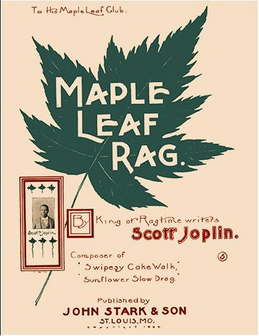
Back راجتايم (موسيقى) Arabic Ragtime AST Reqtaym Azerbaijani Рэгтайм Byelorussian Рэгтайм BE-X-OLD Рагтайм Bulgarian Ragtime Breton Ragtime Catalan ڕاگتایم CKB Ragtime Czech
| Ragtime | |
|---|---|
| Stylistic origins | |
| Cultural origins | Early 1890s,[1] Midwestern and Southern U.S. |
| Derivative forms | |

Ragtime, also spelled rag-time or rag time,[2] is a musical style that had its peak from the 1890s to 1910s.[1] Its cardinal trait is its syncopated or "ragged" rhythm.[1] Ragtime was popularized during the early 20th century by composers such as Scott Joplin, James Scott and Joseph Lamb. Ragtime pieces (often called "rags") are typically composed for and performed on piano, though the genre has been adapted for a variety of instruments and styles.
Ragtime music originated within African-American communities in the late 19th century and became a distinctly American form of popular music. It is closely related to marches. Ragtime pieces usually contain several distinct themes, often arranged in patterns of repeats and reprises. Scott Joplin, known as the "King of Ragtime", gained fame through compositions like "Maple Leaf Rag" and "The Entertainer". Ragtime influenced early jazz,[3] Harlem stride piano, Piedmont blues, and European classical composers such as Erik Satie, Claude Debussy, and Igor Stravinsky. Despite being overshadowed by jazz in the 1920s, ragtime has experienced several revivals, notably in the 1950s and 1970s (the latter renaissance due in large part to the use of "The Entertainer" in the film The Sting). The music was distributed primarily through sheet music and piano rolls, with some compositions adapted for other instruments and ensembles.
- ^ a b c Berlin, Edward A. (2001). "Ragtime". The Grove Music Dictionary. Oxford University Press. doi:10.1093/gmo/9781561592630.article.22825. ISBN 978-1-56159-263-0. Retrieved June 29, 2009.
- ^ Perlman, Itzhak. "The Easy Winners and other rag-time music of Scott Joplin". Archived from the original on April 26, 2013. Retrieved June 17, 2019.
- ^ Reed, Addison W. (1975). "Scott Joplin, Pioneer". The Black Perspective in Music. 3 (1): 45–52. doi:10.2307/1214379. ISSN 0090-7790. JSTOR 1214379.
© MMXXIII Rich X Search. We shall prevail. All rights reserved. Rich X Search